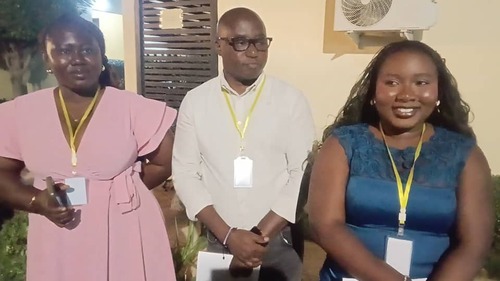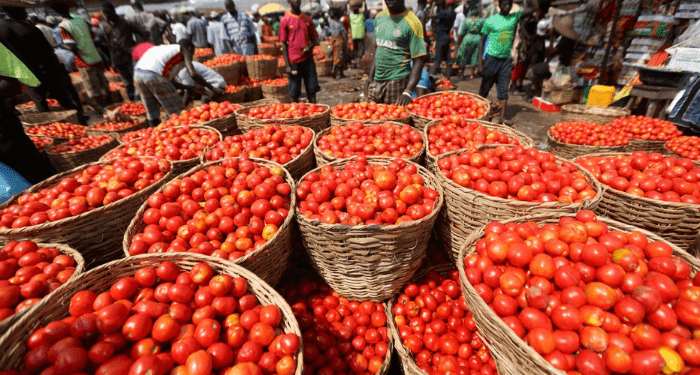Feature By Ngamegbulam Chidozie Stephen
As I traveled through the Upper East, North East, Upper West, Northern, and Savannah regions, I heard a recurring theme from farmers: frustration. The source of their frustration was not drought, pests, or diseases, but rather the high cost of agrochemicals, particularly fertilizers. However, their concerns are deeply intertwined with the escalating impacts of climate change.
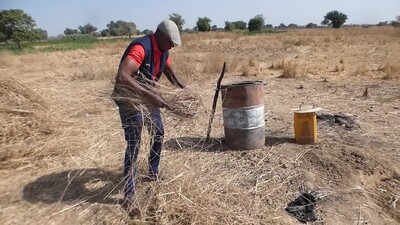
Farmers in these regions, who rely heavily on agriculture for their livelihoods, expressed their concerns about the escalating prices of fertilizers. They lamented that the high cost of these essential inputs was eating into their profits, making it difficult for them to sustain their farming businesses. Climate change has exacerbated this issue, as rising temperatures and changing rainfall patterns have led to decreased crop yields, forcing farmers to rely more heavily on agrochemicals to maintain productivity.
Moreover, the intensive use of chemical fertilizers can lead to soil degradation, water pollution, and loss of biodiversity – all of which are further exacerbated by climate change. As temperatures rise, soil moisture decreases, and extreme weather events become more frequent, the use of chemical fertilizers can have devastating consequences for the environment.
The farmers’ concerns are not unfounded. Climate change is projected to increase temperatures in West Africa by up to 3.5°C by 2100, leading to more frequent droughts, floods, and heatwaves. This will have a disproportionate impact on smallholder farmers, who are already struggling to adapt to the changing climate.
Grass Biochar a game changer
The concept of biochar has been around for over 2,000 years, dating back to the “slash-and-burn” agricultural method practiced by ancient civilizations. However, the modern understanding and application of biochar as a tool for environmental management and climate change mitigation have developed significantly over the past few decades.
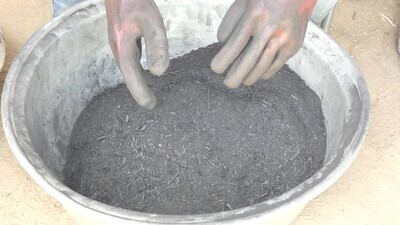
The term “biochar” emerged in the early 2000s, in conjunction with growing concerns about soil management and carbon sequestration.¹ Since then, research and development of biochar technologies have accelerated, with various organizations and initiatives promoting its use as a sustainable solution for environmental and agricultural challenges.
Some notable milestones in the development of biochar include:
A. 2001: The International Biochar Initiative (IBI) was established to promote the use of biochar for environmental management and climate change mitigation.
B. 2009: The IBI published a report highlighting the potential of biochar to mitigate climate change by sequestering carbon in soils.
C. 2012: Researchers began exploring the use of biochar as a soil amendment to improve soil fertility and reduce greenhouse gas emissions.
D. 2024: The Biochar Basics series was published, providing introductory information on biochar used as a container substrate component.
Today, biochar is recognized as a multifunctional material with various applications, including carbon sequestration, soil fertilization, water filtration, and contaminant immobilization.
Innovative Grass Biochar Offers Promising Solutions for Climate Change and Sustainable Agriculture
However, despite all these years of Biochar existence, no scientist or researcher has come out with the innovation of ‘Grass Biochar’.
Fortunately, following the skyrocketing increase of chemical fertilizers and some other farming inputs which has become huge challenge for farmers especially in the northern parts of Ghana, in a groundbreaking development, Prof. David Millar of the Millar Institute for transdisciplinary and Development Studies (MITDS) went into research and later came out with ‘Grass Biochar’, an organic fertilizer with the potential to significantly combat climate change while promoting sustainable agriculture. This innovative product harnesses the power of biochar, derived from grass, to provide numerous environmental benefits.
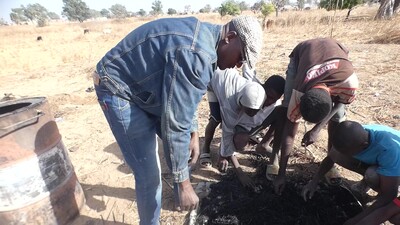
One of the key advantages of ‘Grass Biochar’ is its ability to store carbon in the soil for extended periods. By converting grass into biochar, the carbon is locked away, effectively reducing atmospheric CO2 levels and helping to slow global warming. Studies indicate that widespread adoption of biochar could remove up to 10 gigatons of CO2-equivalent from the atmosphere annually, with the potential to decrease global greenhouse gas emissions by 10-20%.
In addition to its carbon-sequestering properties, Grass Biochar enhances soil health by improving fertility, structure, and water-holding capacity. This leads to better plant growth, reduced soil erosion, and healthier ecosystems, as resilient soils can absorb and store even more carbon.
Moreover, Grass Biochar plays a vital role in reducing greenhouse gas emissions. It has shown effectiveness in lowering nitrous oxide (N2O) and methane (CH4) emissions from soils. By promoting efficient nutrient cycling, it minimizes the need for fertilizers, thus further decreasing N2O emissions.
Grass Biochar also supports regenerative agriculture practices, which promote soil conservation and biodiversity. By utilizing readily available biomass like grass, its production encourages sustainable land management while also addressing the issue of waste, as grass is often viewed as a nuisance.
The benefits of Grass Biochar extend to climate change adaptation as well. Fields enriched with biochar exhibit improved drought resilience and enhanced water retention, helping farmers navigate climate variability and extreme weather conditions effectively.
Furthermore, the potential impact goes beyond environmental benefits. The Grass Biochar initiative could create job opportunities in production and application sectors. Enhanced soil fertility leads to improved crop yields, thereby bolstering food security and availability.
To fully realize the climate change mitigation potential of Grass Biochar, government support is essential. Recommendations for action include research funding to explore optimal production methods and scalability, as well as policy incentives such as subsidies or carbon credits to encourage farmer adoption. Educating farmers, policymakers, and stakeholders about the benefits of biochar and best practices will also be crucial for successful implementation.
Prof. Millar’s Grass Biochar not only presents a viable solution to tackle climate challenges but also promotes sustainable agriculture, ultimately contributing to a more secure food future.
Engaging Prof. Millar, he emphasized that the resources required for grass biochar production are readily available at the local level, unlike chemical fertilizers.
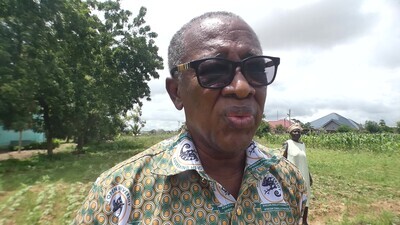
He revealed the project has reached 11 communities across 5 regions, aims to train women’s groups in the production of grass biochar, a revolutionary organic fertilizer.
The impact of this initiative has been nothing short of remarkable. Women who were once struggling to make ends meet are now equipped with the knowledge and skills to produce a valuable resource that enhances their livelihoods.
Throwing more lights, Prof. Millar pointed that grass biochar, made from readily available grass biomass, is a game-changer for smallholder farmers because it improves soil fertility, increases crop yields, and reduces the need for synthetic fertilizers. “This innovative approach to sustainable agriculture has not only improved the women’s economic prospects but also contributed to environmental conservation”. He said
The training program, led by experts from the Millar Institute, has been meticulously designed to ensure that the women acquire the necessary skills to produce high-quality grass biochar. From harvesting and processing grass biomass to producing and applying the biochar, the women have been empowered with comprehensive knowledge.
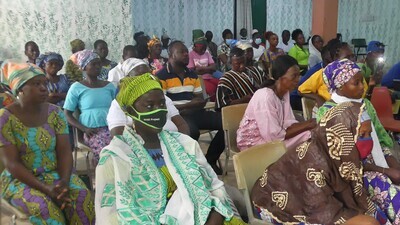
The enthusiasm and dedication of the women participating in the program have been inspiring. They have formed cooperatives, shared knowledge, and supported one another in their journey to become grass biochar producers.
As the project continues to expand, the Millar Institute, FAO, and A-ROCHA remain committed to providing ongoing support and guidance to the women. The ultimate goal is to create a sustainable, community-driven initiative that promotes environmental conservation, improves livelihoods, and empowers women to become leaders in sustainable agriculture.
MITDS, has collaborated with Ghana Federation of Forest and Farm (GhaFFaP)/ Forest and Farm Facilities(FFF) and they have implemented three major projects: grass paper production, charcoal production, and tree planting for reforestation and water conservation.
Meanwhile, according to Prof. Millar, while paper production requires industrial-scale investment, charcoal and biochar production can be done at the community level, empowering farmers to take ownership of their soil fertility.
The grass biochar revolution in Ghana is a shining example of how innovative approaches to sustainable agriculture can transform lives and communities. As the women continue to thrive, their success will inspire others to join the movement, creating a brighter, more sustainable future for all.
Peasant Farmers Association of Ghana Throws Weight Behind Grass Biochar Innovation
In a bold move, Wepia Awal Adugwala , President of the National Peasant Farmers Association of Ghana, has pledged his organization’s support for any individual or group developing innovative organic fertilizers, such as Grass Biochar. This endorsement is a significant boost to the agricultural sector in Ghana, which has long struggled with poor soil fertility and high costs of chemical fertilizers.

According to Awal, the Peasant Farmers Association is eager to collaborate with anyone who can provide solutions to the country’s agricultural challenges. “We are in support of any technology or indigenous innovation that will develop organic fertilizers, particularly Grass Biochar,” he emphasized. Awal believes that these innovations will not only improve soil fertility but also increase crop production and reduce the financial burden on farmers.
The association is now calling on the government of Ghana to provide support for these initiatives, particularly those focused on indigenous technologies. By promoting local solutions, the government can help reduce the country’s reliance on imported chemical fertilizers, which are not only expensive but also subject to fluctuating exchange rates.
As Awal pointed out, the high cost of chemical fertilizers is a significant challenge for farmers in Ghana. “We spend a lot of money on these fertilizers, and their prices keep rising due to the exchange rate,” he lamented. By embracing organic fertilizers like Grass Biochar, farmers can reduce their production costs and improve their overall livelihoods.
Awal’s commitment to promoting sustainable agricultural practices is not new. As the leader of the Peasant Farmers Association, he has consistently advocated for policies and initiatives that support small-scale farmers and promote food security in Ghana. His endorsement of Grass Biochar is just the latest example of his dedication to improving the lives of farmers and promoting sustainable agriculture in Ghana.
Regional Agric Director Embraces Grass Biochar Innovation
As i paid a visit to Alhaji Zakaria Fuseinii, the Upper East Regional Director of Agriculture, to discuss the innovative grass biochar project championed by Prof. Millar. As we sat down in his office, I was eager to hear his thoughts on this groundbreaking initiative.
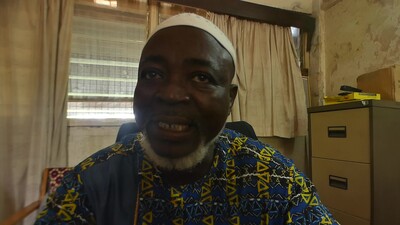
Alhaji Fuseini began by acknowledging the significant challenges faced by farmers in the Upper East region, particularly with regards to soil quality. “We have one of the poorest soils in Ghana,” he admitted. However, he also expressed his concern about the impact of climate change on agriculture, affecting not only the soil but also water resources.
Despite these challenges, Alhaji Fuseini’s face lit up when discussing Prof. Millar’s grass biochar innovation. He described it as a “laudable and welcome innovation” that has the potential to transform the agricultural landscape in the region.
Grass biochar, a type of organic fertilizer produced from grass biomass, offers a sustainable solution to improving soil fertility and mitigating the effects of climate change. Alhaji Fuseini’s endorsement of this innovation is a significant step towards promoting sustainable agricultural practices in the Upper East region.
As our conversation came to a close, I couldn’t help but feel a sense of optimism about the future of agriculture in the region. With leaders like Alhaji Fuseini embracing innovative solutions like grass biochar, there is hope for a more sustainable and resilient agricultural sector.
Agric Professor Hails Grass Biochar as Game-Changer in Climate Change Fight
Professor Daniel Oppong-Sekyere of the School of Agriculture at Bolgatanga Technical University enthusiastically endorsed Grass Biochar as a “promising technology” that will play a crucial role in addressing climate change and its associated challenges.

According to Professor Oppong-Sekyere, the abundance of grass in the region, particularly during the rainy season, makes the concept of harvesting and converting it into biochar a welcome innovation. This approach ensures sustainability, reduces reliance on expensive fertilizers, and benefits farmers in the region.
The professor highlighted the significance of this innovation in the context of the region’s rainfall pattern, which is characterized by prolonged drought periods. Any innovation that supports farmers in increasing their production is a valuable asset, he emphasized.
Grass Biochar’s ability to contain high amounts of carbon makes it an effective tool in minimizing greenhouse gases and mitigating climate change. By serving as a carbon sink, biochar prevents carbon leakage into the atmosphere, thereby reducing the impact of climate change.
Professor Oppong-Sekyere of the school of Agriculture at Bolgatanga Technical University (BTU) concluded that Grass Biochar is a groundbreaking innovation that will contribute significantly to addressing climate change. Its potential to support sustainable agriculture, reduce fertilizer costs, and promote environmental sustainability makes it a game-changer in the fight against climate change.
Risk of attached to Agrochemicals such as Fertilizer
The widespread use of agrochemicals has led to a toxic legacy, putting human health at risk. Exposure to these chemicals has been linked to a range of diseases, including cancer, chronic toxicity, and reproductive disorders.
The impact of agrochemicals is far-reaching, contaminating not only the body but also water and air. Direct exposure through inhalation or ingestion can lead to severe health problems, including respiratory infections, anemia, and multi-generational reproductive effects.
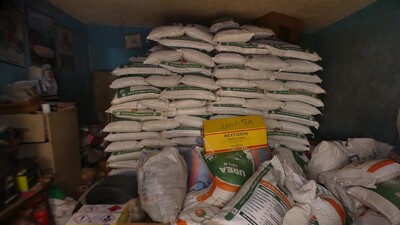
The statistics are alarming. In developing countries, agrochemical pollution has resulted in approximately 10,000 deaths and severely impacted the health of 40,000 people. Farmers and their families bear the brunt of this pesticide crisis, making urgent action necessary to control the application of agrochemicals and safeguard human health.
The need for intervention is clear. Reducing our reliance on agrochemicals and promoting sustainable agricultural practices like grass biochar is crucial to protecting the health and well-being of individuals and communities worldwide.
GAWU Union Chairman Endorses Grass Biochar as Natural Fertilizer
Adam Jibril, the Union Chairman of the General Agricultural Workers’ Union (GAWU), ICOUR Chapter, when visited threw his weight behind the grass biochar, an innovation that promises to revolutionize the agricultural sector.
According to Jibril, any fertilizer that is close to nature and doesn’t damage the soil is the best alternative for farmers. He believes that this innovation, which serves as a substitute to chemical fertilizers, is a game-changer for the soil and human health.

Jibril is optimistic that this innovation will bring numerous benefits to farmers. “It will help the soil, it will help our health situations, and probably, it will help in bringing down the cost of input that farmers spend on season after season and year after year,” he explained.
The Union Chairman also highlighted the limitations of chemical fertilizers, which are often applied inefficiently, leading to significant losses to the atmosphere. In contrast, natural fertilizers like the grass biochar offer a more sustainable and environmentally friendly solution.
Jibril’s endorsement of this innovation is a significant boost to efforts to promote sustainable agriculture in Ghana. As he aptly put it, “I think it’s a good innovation that must be received with all arms. It will help farmers improve their yields.”
Commercializing Grass Biochar
Executive Director of Maaltaaba Pesaent Women Farmer Cooperative, Miyella Lydia, expressed her enthusiasm for the grass biochar innovation, pointing its potential to improve the environment and empower vulnerable widows.

She shared her organization’s experience with grass biochar and their plans to commercialize its production.
“Our main focus is on the environment, and when this technology was introduced, I was thrilled,” she said. “Through the Forest and Farm Facility (FFF) project, we have acquired a lot, and Chief has given us land where we have demonstrated the grass biochar. The women I work with cannot afford certain inputs for their farms, so when this technology was introduced, we embraced it.”
Madam Miyella explained that her organization has demonstrated grass biochar in their farms, backyard gardens, and Portray farms, encouraging their women to use it. “We know that when there’s enough biochar on the soil, it helps with water retention, which is crucial in the Upper East region where we have drought issues,” she added.
She highlighted the benefits of grass biochar, including its ability to take away the scent in Portray farms and its use as fertilizer. “We are planning to commercialize it next year, and we pray that if you want to buy, you can visit Maba, and they will start measuring it in both for people to buy,” she said.
Madam Miyella further emphasized that her organization has received the technology wholeheartedly and is committed to promoting it. “It is a very good technology, and we are going to do it because it is something that will help our women,” she concluded.
Unlocking the Potential of Grass Biochar
As part of the AGRICORD ALLIANCE visit to the Upper East Region, I had the opportunity to accompany the team to various farms in the area. It was an eye-opening experience, seeing firsthand the challenges and opportunities faced by farmers in the region. Later, I had the chance to sit down with Jenny Ohman, an Agriculture and Gender expert, to discuss one of the innovative solutions being explored in the region: Grass Biochar.
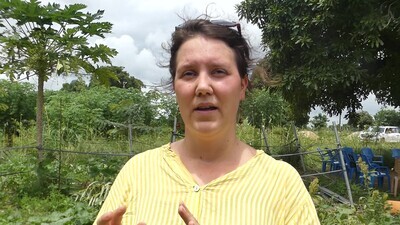
Jenny’s enthusiasm for Grass Biochar was infectious. “One of the amazing things about Grass Biochar,” she explained, “is that it can stay in the soil for up to three years after application.” This, she noted, makes it a highly effective and sustainable way to improve soil fertility and structure.
But what really struck me was Jenny’s emphasis on the accessibility of Grass Biochar. “The beauty of it is that farmers can use materials that are readily available to them, and at an affordable cost, to produce the Biochar,” she said. This, she explained, makes it an ideal solution for smallholder farmers in the region, who often struggle to access expensive fertilizers and other inputs.
AGRICORD ALLIANCE Member Hails Biochar
Martin Agboton‘s face lit up with excitement as he shared his observations after visiting farms in the northern regions of Ghana. As a member of the AGRICORD ALLIANCE, Martin had the opportunity to witness firsthand the impact of the Grass Biochar innovation on farmers in the region.
“Farmers need to take the Grass Biochar seriously,” Martin emphasized. “It has the potential to revolutionize agriculture in the northern regions of Ghana.” He noted that the Biochar innovation could help address some of the key challenges faced by farmers in the region, including poor soil fertility and limited access to affordable fertilizers.
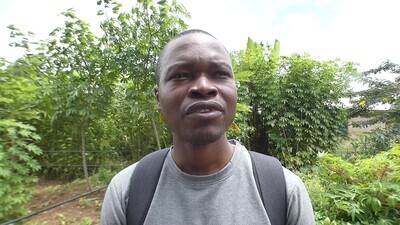
Martin’s enthusiasm for the Grass Biochar innovation was palpable. He believes that it could be a game-changer for farmers in the region, helping to improve crop yields, reduce soil degradation, and increase their overall productivity.
As Martin reflected on his visit, he couldn’t help but feel a sense of optimism about the future of agriculture in northern Ghana. With innovations like the Grass Biochar, he believes that farmers in the region can overcome some of the key challenges they face and build a more sustainable and prosperous future.
Local Farmers Find Hope in Grass Biochar
Mark Akparibo, Executive Director of Tere-bere and National Secretary of GHAFFaP, has witnessed the transformative power of grass biochar firsthand. “We’ve seen the impact of grass biochar on our farms,” he said. “It’s a game-changer for our farmers, who are struggling to cope with the challenges of climate change.”

Grass biochar, a type of charcoal made from grass, has been shown to improve soil fertility, increase crop yields, and reduce soil erosion. For farmers in northern Ghana, who are already vulnerable to the impacts of climate change, grass biochar offers a beacon of hope.
As temperatures rise and rainfall patterns become more unpredictable, farmers in the region are facing unprecedented challenges. But with grass biochar, they may have found a way to not only adapt to climate change but also mitigate its impacts.
By improving soil health and increasing crop yields, grass biochar can help farmers build resilience to climate change. And as Mark Akparibo notes, “It’s a solution that’s accessible to our farmers, who are already struggling to make ends meet.”
As the world grapples with the challenges of climate change, the story of grass biochar in northern Ghana offers a powerful reminder of the importance of local, community-led solutions. By empowering farmers with the tools and knowledge they need to adapt to climate change, we can build a more sustainable and resilient future for all.
We didn’t regret investing in Grass Biochar
For Madam Alima Sagito Saeed, national President of the Ghana Federation of Agricultural Producers (GHAFFaP), investing in Grass Biochar has been a move that her group hasn’t regretted.
“We took a risk by investing in Grass Biochar, but it has paid off,” Madam Saeed said with a smile. “Our farmers have seen significant improvements in soil fertility, crop yields, and reduced soil erosion. It’s a game-changer for us.”
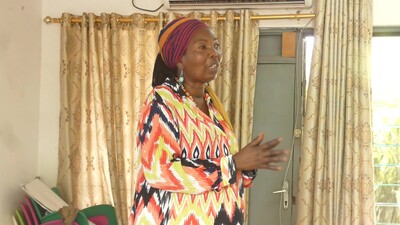
Grass Biochar, a type of charcoal made from grass, has been shown to have numerous benefits for farmers. It improves soil structure, increases water retention, and reduces the need for synthetic fertilizers. For farmers in Ghana, who are already vulnerable to the impacts of climate change, Grass Biochar offers a beacon of hope.
“Climate change is real, and it’s affecting our farmers dearly,” Madam Saeed said. “But with Grass Biochar, we’re seeing a significant reduction in greenhouse gas emissions, improved soil health, and increased resilience to extreme weather events.”
Grass Biochar, effective tool for environmental sustainability and climate change mitigation
Dr. Maxwell Tengolzor Ba-an, the Biochar Project Supervisor at Millar Institute for Transdisciplinary and Development Studies (MITDS), emphasized the importance of biochar in sustainable agriculture.

Speaking about policies and strategies for climate change mitigation, sustainability and agriculture.
Dr. Ba-an highlighted the benefits of biochar. He explained that biochar is an effective tool for environmental sustainability and climate change mitigation.
The project, which has received funding for two years, aims to train women in rural communities to produce biochar and use it to improve their crops. Dr. Ba-an emphasized that biochar is a cost-effective and environmentally friendly solution for rural farmers, unlike chemical fertilizers which are expensive and harmful to the soil.
He mentioned that the project has already seen success in the Northern region, where five men’s groups have been trained to produce biochar. Dr. Ba-an expressed his hope for the project to influence national policies and promote sustainable agriculture practices.
A Seasonal Experiment: Prof. Millar’s Quest for Sustainable Farming
As I stepped onto Prof. Millar’s farm, I couldn’t help but notice the vibrant greenery that surrounded me. The professor, a renowned expert in sustainable agriculture, welcomed me with a warm smile and invited me to join him on a tour of his seasonal experiment.
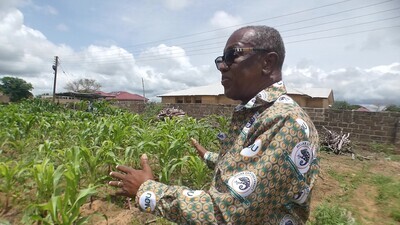
The experiment, designed to monitor the progress of different farming methods, was divided into three sections: A, B, and C. Section A featured a plot where Prof. Millar had applied A. Grass biochar, a natural soil amendment made from grass waste. Section B was treated with chemical fertilizer, a common practice in conventional farming. Section C, however, was left untouched, with no chemical applications whatsoever.
As we walked through the plots, Prof. Millar explained the rationale behind his experiment. “I want to compare the effects of different farming methods on soil health, crop yield, and environmental sustainability,” he said. “By monitoring the progress of these three sections, I hope to gain valuable insights into the most effective and sustainable approach to farming.”
Prof. Millar’s experiment was a testament to his commitment to sustainable agriculture and his desire to find innovative solutions to the challenges facing modern farming. As I left the farm, I couldn’t help but feel inspired by the professor’s dedication to his craft and his passion for creating a more sustainable food system.
Conclusion
The widespread reliance on agrochemicals such as fertilizer in Ghana’s agriculture sector has severe repercussions on crop productivity, soil health, human well-being, and biodiversity. Although agrochemicals have contributed significantly to increased yields, their detrimental impacts necessitate immediate attention and action.
To address these challenges, a multi-faceted approach is crucial. This includes:
A. Regulatory measures to control agrochemical use
B. Public awareness campaigns to educate farmers and consumers
C. Adoption of organic farming methods to reduce agrochemical dependence
By implementing these strategies, Ghana can mitigate the adverse effects of agrochemicals and ensure the long-term sustainability of its agricultural sector.
Ultimately, this research emphasizes the critical need to integrate environmental and human health considerations into agricultural policies and practices. By doing so, Ghana can foster resilient, equitable, and sustainable food systems that prioritize the well-being of both people and the planet.
Source: Apexnewsgh.com/ Ngamegbulam Chidozie Stephen
Email: apexnewsgh@gmail.com
Contact: +233256336062

